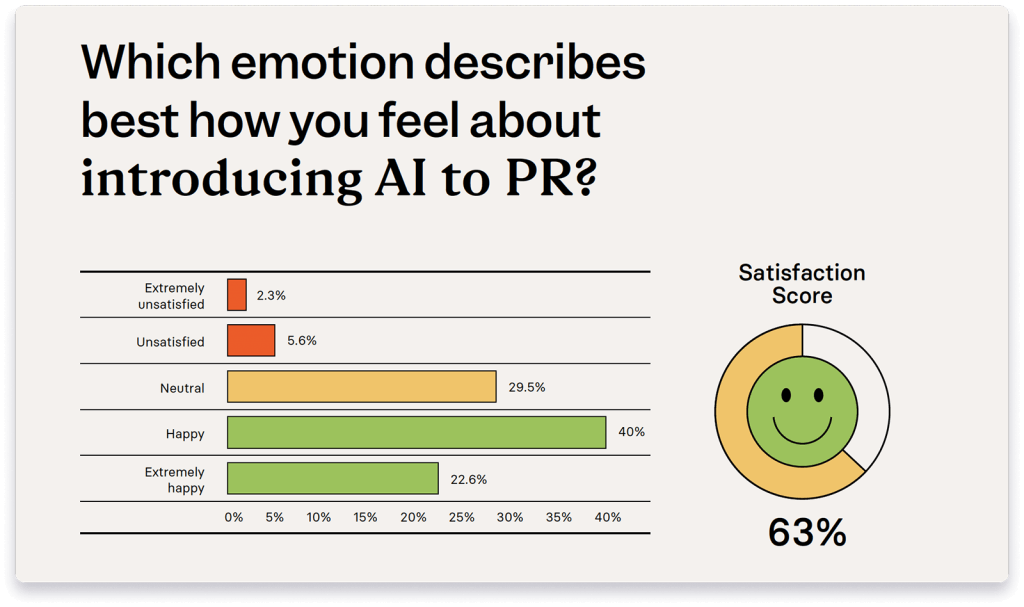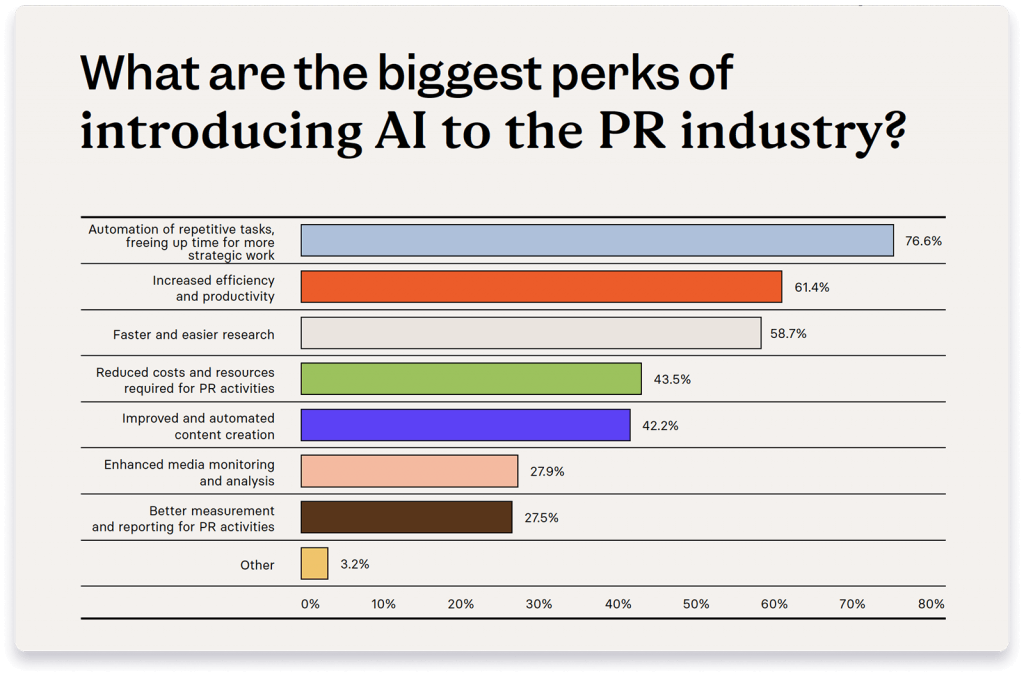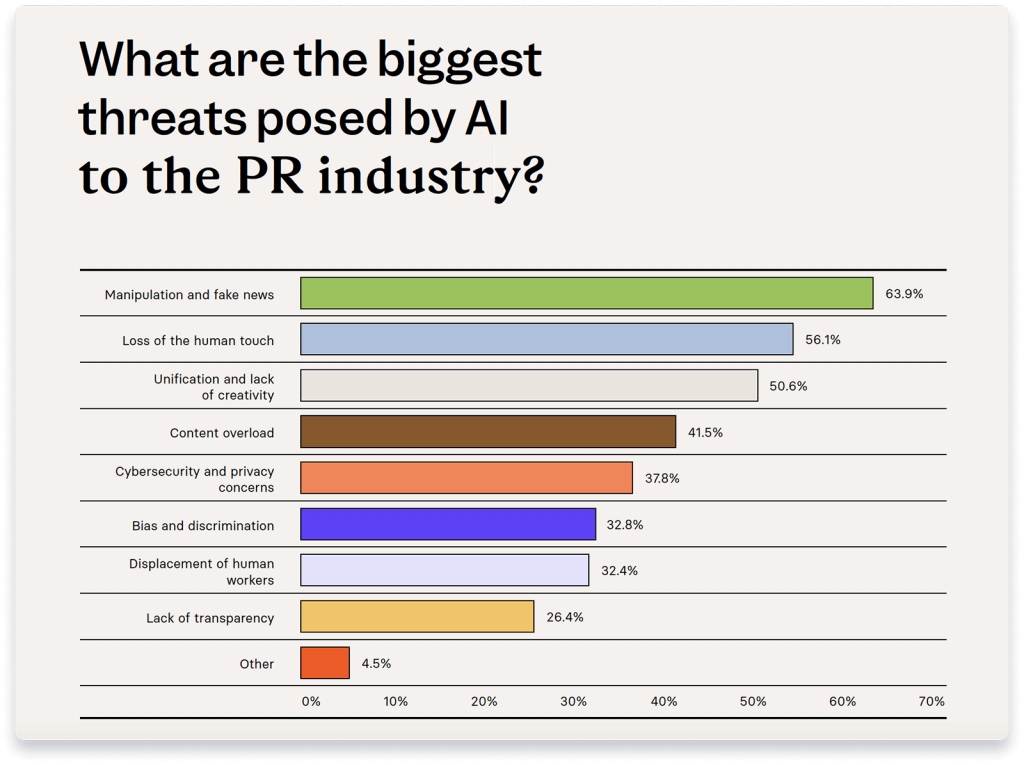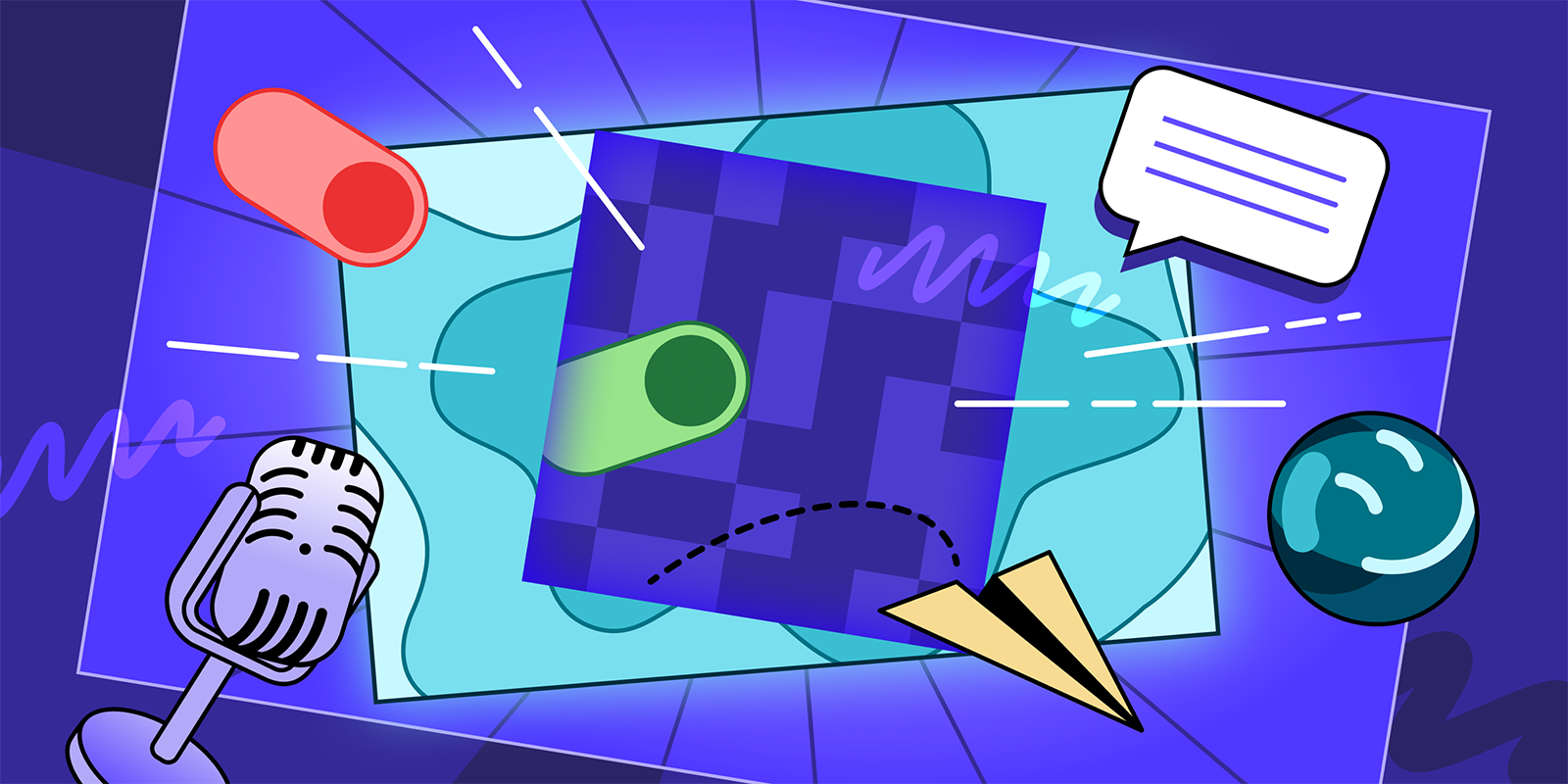When ChatGPT first launched, it turned the world of work upside down. From the intern to the CEO, everyone started using generative AI to save time and become more efficient. Public relations is no different and, very quickly, we got new AI tools for public relations, for everything from social media automation to handling crisis management.
Today, we'll explore the role of AI for public relations professionals. How it's used, what (not) to use it for, and where we're headed as an industry.
By the way, now you can use AI in PR with Prowly! We launched our own AI PR features to cover every step of creating a press release. From brainstorming ideas to drafting and editing content, connecting with the perfect journalists, and even summarizing your press release in emails.
Role of AI in PR: our research

Our report revealed a clear link between AI adoption and professional satisfaction. Among PR pros who describe themselves as “happy” or “extremely happy” with their AI use, 80.2% are regular users, and 65% feel confident in their ability to use it effectively.
In short: the more you use AI, the more value you get from it.
That value shows up in everyday tasks. PR teams are using AI to:
- Save time on research and content ideation
- Analyze sentiment across thousands of brand mentions
- Generate press release drafts and automate editing
- Uncover trends in customer feedback or media coverage
What used to take hours can now be done in minutes. And in a field where timeliness is everything, this kind of efficiency isn’t just nice to have—it’s essential.
AI isn’t here to replace you—it’s here to help you focus on what you do best: strategic thinking, building relationships, and telling impactful stories.
Here's just a simple example of how you can leverage AI in your day-to-day work.
Use case #1: Generative AI for ideas and inspiration
Generative AI can be a powerful creative partner—especially when you're staring at a blank page. Tools like Prowly’s AI can assist with brainstorming ideas, developing angles, and kickstarting content when you're feeling stuck.
Let’s say you’re writing a press release. Instead of drafting from scratch, just enter the key facts—what happened, why it matters, and who it is for. In seconds, Prowly AI will generate a working first draft you can fine-tune and personalize for your audience.
It’s not about replacing your ideas—it’s about accelerating them.
Use case #2: Content creation with AI
AI that benefits from Natural Language Processing puts the power to quickly generate press releases and PR reports directly into your hands.
The AI model may not be a match for human expertise. But it can significantly enhance human capabilities by helping create personalized content. Bear in mind that tools such as ChatGPT, Claude, Perplexity, and others use human data for training.
Over time, these tools improve because of their training, helping you create more effective content that lands nicely with your target audience.
Need help prompting? Check out our top ChatGPT prompts for PR pros.
Use case #3: Speeding up research with AI
Research is a critical—but often time-consuming—part of PR work. AI-powered tools can help you gather background info, track competitor activity, or dig up relevant media stories in seconds instead of hours.
Though ChatGPT is helpful for structuring information or summarizing sources, it’s not always up to date. While tools like Perplexity can pull real-time data from the web, helping you build pitches, press releases, and reports with more confidence and relevance.
The result? Less time on manual digging, more time on insight and strategy.
Use case #4: Media monitoring with AI
Beyond AI-generated content, we can find even more uses. AI can perform sentiment analysis to track the success of our PR campaigns. Giving you the data you need to head off any potential crises.
AI can also provide data analysis, providing PR professionals more time to apply their human expertise to great PR strategic planning.
Using generative AI for analyzing sentiment is nothing new, and it's not particularly useful for individual posts. But analyzing hundreds of social media posts at once with AI can help you uncover trends and understand what people are saying, where, and why.
Most importantly, it can help you find sudden spikes in negative mentions, so you can prevent crises before they become really bad.
Use case #5: AI assistance in reporting
The idea of using AI for public relations wouldn't be complete if we left out reporting. AI-powered tools can act as virtual assistants to help show the value of your work.
AI technology helps by providing the raw data and sentiment analysis needed to link sales results with earned media coverage.
It also provides historical data analysis, tracks market trends, and measures the performance of PR communication campaigns over time to help secure future budgets.
Benefits of Artificial Intelligence in Public Relations

Now, onto the good stuff. When it comes to public relations and technology, we're always looking for those little quality-of-life perks. Machine learning tools are no exception.
To perform tasks such as sentiment analysis and keeping track of social media is the essence of AI PR. AI public relations should make our work more efficient and free PR pros up for more creative work.
But let's take a closer look at how PR pros are profiting from AI in communication today.
#1. Smarter media monitoring, stronger reporting
AI’s greatest strength in PR? Turning noise into insight. According to our survey, 27.9% of PR pros use AI for enhanced media monitoring, while 27.5% rely on it for advanced measurements and reporting.
AI-powered tools can analyze thousands of social media mentions, news articles, and online conversations in real time—something no human team could do manually. They extract meaningful patterns, perform sentiment analysis, and dig up the insights that matter most.
The result? A powerful time-saver and decision-making asset. You spend less time digging through data and more time using it to shape campaigns, optimize strategy, and support budget proposals with hard numbers.
Try Prowly's media monitoring free for 7 days
Start tracking your brand and keywords for free (no credit card required) in Prowly.
- Comprehensive monitoring: Track the web and social media mentions.
- Transparent pricing: Plans start at $258/month
- All-in-one platform: Get everything you need in one tool for PR, incl. media database, outreach, reporting, and more
#2. Operational efficiency
AI is helping PR pros get more done faster. 61.4% of early adopters report increased efficiency, with 76.6% using AI to automate repetitive tasks and free up time for strategic work.
It’s also speeding up research for 58.7% of users and boosting content creation and ideation for 42.2%.
Less busywork. More brainwork.
#3. Faster, smarter research
AI tools are reshaping how PR pros gather insights. From monitoring media coverage to digging into competitor strategies, 58.7% of professionals use AI to speed up research across platforms.
Instead of spending hours sifting through articles or social posts, you can now get instant summaries, trend overviews, and relevant data—all with a single prompt.
This lets you move faster, act on real-time information, and stay ahead of the conversation.
#4. Reduced costs
AI isn't just a time-saver—it’s a cost-saver too. 43.5% of PR professionals say AI tools have helped cut business costs and resource needs.
By automating repetitive tasks, accelerating research, and streamlining content creation, AI reduces man hours and frees up teams to focus on high-value work.
In an industry where budgets are tight and expectations are high, that’s a game changer.
#5. Smarter content creation
AI is becoming a creative ally for PR teams. 42.2% of professionals already use it to enhance their content—from writing personalized messages to generating social media posts and brand storytelling ideas.
It’s a fast, flexible way to go from concept to first draft. But while AI can kickstart the process, human insight is still essential for adding nuance, creativity, and that final polish.
Example: Creating a press release with Prowly AI
Say you’ve just finalized a product launch. Instead of staring at a blank page, you open Prowly AI, fill in a few key details—what’s new, why it matters, and who it is for—and the tool generates a complete press release draft in seconds. You can tweak the tone, expand on key points, and then instantly generate a summary to include in your email pitch. From concept to outreach, the entire process takes minutes, not hours.
AI in Public Relations: ethical considerations

AI tools for PR offer incredible speed and scale—but in public relations, where trust is currency, ethics can't be an afterthought. From misinformation risks to data security and algorithmic bias, PR teams need to use AI tools responsibly and transparently.
Our research confirms that ethical concerns aren’t hypothetical. In fact:
- 63.9% of PR pros worry about fake news and content manipulation
- 37.8% cite data privacy and cybersecurity as major issues
- 32.8% are concerned about AI-generated bias
These concerns are real—and ignoring them could damage client trust, brand reputation, or even result in legal trouble.
Here are just some of the things to keep in mind when using AI in public relations.
#1. A commitment to accuracy: double-check everything
In PR, credibility is non-negotiable. So it’s no surprise that 63.9% of professionals name misinformation—like AI-generated fake news or manipulated media—as one of their top concerns.
Generative AI can produce content that sounds confident but isn’t always correct. Known as "hallucinations," these errors can sneak into press releases, pitches, or reports—damaging trust and sparking unwanted crises.
The fix? Always verify facts, quotes, and data before publishing AI-generated content. It’s one extra step, but far less costly than issuing a public correction later.
AI can speed things up—but human oversight is what keeps it credible.
#2. Protect sensitive data: use AI responsibly
37.8% of PR pros say cybersecurity and privacy are top concerns when using AI tools—and for good reason.
Generative AI tools like ChatGPT and others often use input data to train future models. That means anything you type—campaign briefs, client names, unpublished strategies—could unintentionally end up in someone else's output.
Just ask Samsung, which accidentally leaked sensitive code through an AI chatbot. Or Valve, which paused AI-generated game content over copyright concerns.
As a rule of thumb: never input anything you wouldn’t want published online. Use AI for brainstorming and drafting, but keep confidential client data out of the prompt box.
Your client’s trust—and your reputation—depends on it.
#3. Be transparent about AI use
In communications, trust is everything—and 26.4% of PR pros say they’re concerned about the lack of transparency in how AI is used.
When AI-generated content mimics human communication without disclosure, it can feel deceptive. And that perception can damage credibility—not just with audiences, but with clients and colleagues, too.
That’s why the PR Council recommends openly stating when generative AI tools are used in the creative process. This isn’t just ethical—it’s smart business.
Everyone’s using AI. What sets the best apart is how clearly and confidently they explain it.
So be upfront. Add a human touch. And let transparency build the trust your work depends on.
P.S. Here’s an article that might come in handy if you’re looking for a tool to measure the impact of your communication efforts.
#4. Use diverse training data: evaluate AI for biases
AI tools learn from human behavior—and that includes our blind spots. This can lead to biased language, underrepresentation, or culturally insensitive content in both text and visuals.
For PR professionals, this isn’t a minor flaw—it’s a brand risk. In fact, 32.8% of our respondents list AI bias as a top concern.
To prevent a public relations AI-related crisis, don’t rely on a single AI tool. Compare outputs from platforms like ChatGPT, Claude, and Perplexity to spot inconsistencies or skewed messaging.
And remember: AI should support, not replace, the value of diverse perspectives. Real inclusivity still requires human oversight.
Extra tip: Need a deeper dive? Check out our guide to building an ethical AI framework, based on PR Council recommendations.
#5. Where AI meets human empathy
Two of the biggest fears PR professionals have about AI? Losing the human touch (56.1%) and a decline in creativity (50.6%). And those fears are valid.
While AI can generate ideas, headlines, even full press releases, it can’t replicate empathy. It can’t read a room, adapt to emotion, or build a meaningful relationship. That’s still your job.
The best outcomes happen when humans and machines work together. Use AI to handle the heavy lifting—then add your insight, experience, and voice.
AI can support your storytelling. But only you can make it matter.
AI and Public Relations: a smarter way forward
Using AI in public relations is no longer a novelty—it’s becoming the norm, as long as it's used responsibly. But let’s be clear: AI in PR is still evolving. Without clear guidelines, transparency, and human oversight, even the smartest tools can create unnecessary risks.
At Prowly, we’ve built our AI features specifically for PR professionals—to enhance the way you ideate, write, and share your stories. Our AI-powered suite helps you:
- Generate press releases from just a few key inputs
- Brainstorm headlines and angles in seconds
- Edit and improve drafts with smart suggestions
- Summarize press releases into email pitches
- Connect with relevant journalists via our integrated media database
It’s all designed to save time, improve quality, and give you a strategic edge—without losing your voice or creativity.
AI can’t replace the PR pro. But it can absolutely make your work more impactful.
